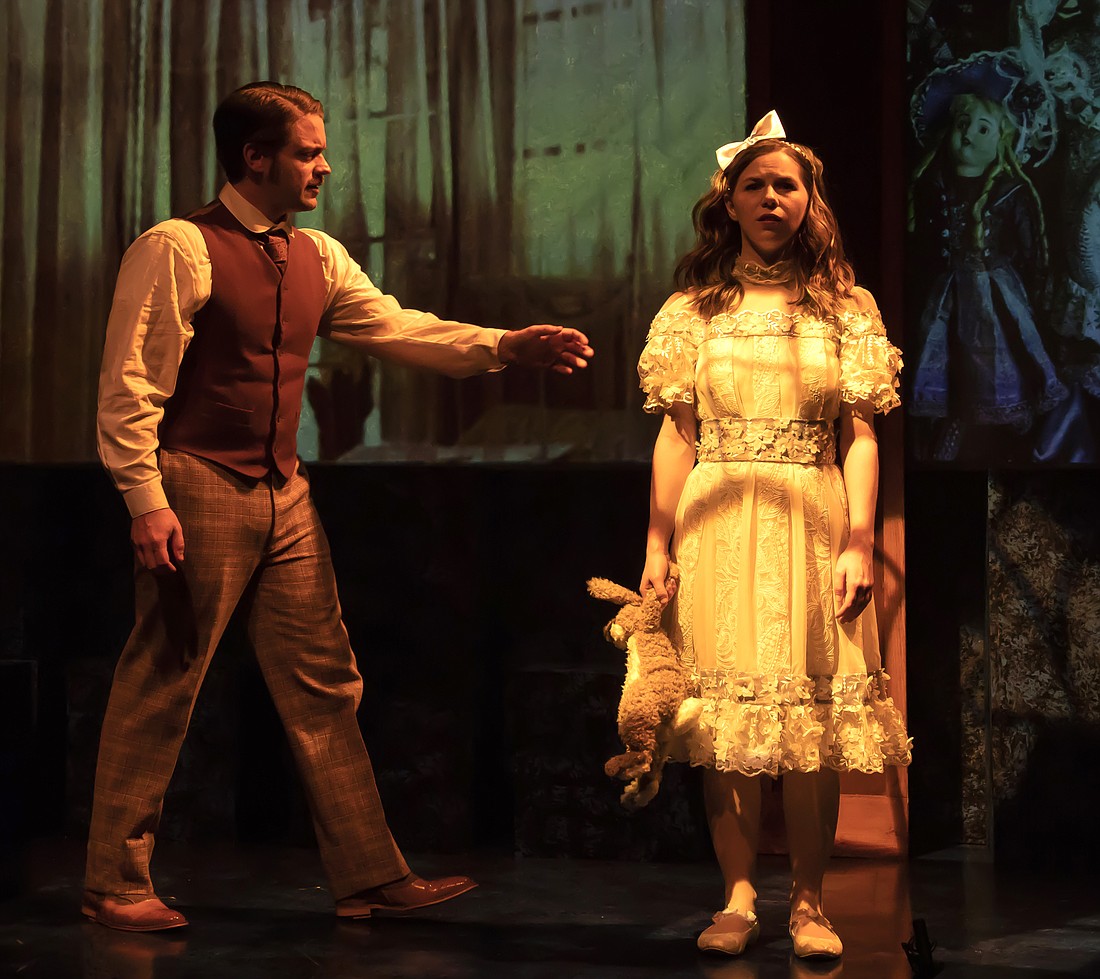- April 30, 2024
-
-
Loading

Loading

What is identity? What is reality? How can you distinguish between reality and a clever simulation? Does the mind exist separately from the body? If you put someone’s mind in a different body, are they now a different person?
Sooner or later, all the big philosophical questions become software engineering problems. Given a little more time, they become legal problems.
That’s the starting point of Jennifer Haley’s “The Nether,” the latest Stage III production at Florida Studio Theater.
Haley’s play unfolds in the not-too-distant future. A lousy future. Earth’s biosphere has been laid waste. Education, employment and recreation have mostly shifted to the Nether — the offspring of the Internet, now evolved into a totally immersive virtual reality space. The dark web has also evolved (or devolved). The Nether is dotted with illicit, untraceable realms catering to unholy desires. The Hideaway is one of them. Its well-paying customers are pedophiles and child murderers.
That’s highly illegal, even in the Nether. But true to its name, the Hideaway remains well hidden from the authorities, until an undercover agent infiltrates and returns with a disturbing report.
The Hideaway is a delightful Victorian manse with a lovely garden. A place of horror, but tasteful.
It’s beautiful, lovingly detailed and experientially indistinguishable from physical reality. “Papa” (William Thomas Evans) is the realm’s ruler. Iris (Leah Greene) is his favorite girl. She’s the latest in a long line of identical virtual victims. (Which may have started with a real-world victim.) Papa is a megacreep with a God complex, who insists his guests axe a child sooner or later. (They always come back to life! It’s only a game!) Papa’s real-world name? According to the undercover agent: Sims.
Detective Morris (Anique Clements) quickly hauls Sims in and grills him. She’s determined to find the Hideaway’s covert server and pull the plug. Sims scoffs at her moral outrage with heroic rationalization: Our children aren’t really children, he protests, merely paid adult actors inhabiting their childish avatars. The rapes aren’t really rapes; the murders aren’t really murders. It’s all just make-believe, so what’s the problem?
Morris’ next interrogation is equally fruitless. Doyle (Sam Mossler) is a middle-school science teacher who’s either a Hideaway worker or a client. (In the Nether, you never can tell who’s behind the digital puppet.)
Doyle has some weird connection to Sims and to a timidly polite guest named Woodnut (Eric Gilde). Morris wants him to testify, but Doyle just wants to vanish. In this Brave New World, you can become a “Shade” — your body goes on permanent life support and your mind stays plugged into the Nether until it dies. Doyle isn’t talking, either.
The play messes with your mind. Nostalgic Victoriana (Victrolas and brandy and billiards) alternates with genteel serial killing, stripped of consequence. Jason Cannon’s direction slowly ratchets up the tension.
Evans’ Sims is appropriately odious. With his sociopathic, narcissistic, pedophilic and homicidal nature, he feels he’s performing a needful social service. His realm offers and outlet for pent-up tensions (for others like him). Greene’s Iris is creepy-sweet. Apart from the twisted subtext, she could be a child actor in some Merchant-Ivory period drama.
Clement’s Morris is on a mission from God. She’s a bit of a Javert — in merciless pursuit of a merciless criminal. Mossler’s Doyle is a nice man who’d rather be dead. Gilde’s Woodnut is a nice man taking his first steps to hell. Or so it seems.
Bruce Price’s minimalist set evokes the limbo of a classic “Outer Limits” episode — a screen scrolling digital hash, a few cubes and an old record player. Price sharply evokes a place that’s no place. Lea Umberger’s costumes capture the stiff, overstuffed Victorian garb of the virtual realm and the stark efficiency of denatured reality.
Dark territory, but it never gets explicit. You hear about it, but never see it. No blood is spilled, virtual or otherwise. Nothing sordid happens on stage. And the virtual child character is played by a young adult. The playwright leaves the nasty bits to your imagination. That’s nasty enough.
Haley’s a fine writer and no stranger to science fiction. She’s done this before, and you can tell. She’s got a firm grasp of police procedurals too.
The reality-bending concepts Haley explores are cyberpunk staples, and go back to Philip K. Dick, Ray Bradbury and before. They’re only recently finding mainstream exposure in plays like “The Nether,” and television programs like “Black Mirror” and “Westworld.” The bad news is finally getting out, and that’s a good thing.
Sooner or later, these fictional fears might be reality. We’ll have to face them in the not-too-distant future. It’s a gutsy decision for FST to face them now.